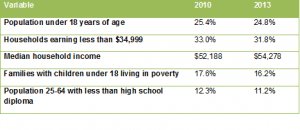
12 Nov Workforce by the Numbers: Charlotte leaders working to improve economic mobility for youth
Workforce by the Numbers is our monthly look at the statistics and data that are shaping the workforce in the Charlotte region.
Harvard University and the University of California – Berkeley published a study in May 2015 examining upward economic mobility for children living in large metropolitan areas. The study used a sample of low-income children born between 1980 and 1982, whose income was studied in 2011 and 2012, when they reached approximately 30 years old. The researchers defined low-income as a family whose average income is in the bottom quartile of all families.
The study indicates Charlotte/Mecklenburg County ranked 50th out of 50 large metropolitan areas for upward mobility, meaning youth born into poverty in Charlotte are more likely to stay in poverty than youth in any other large metropolitan area in the United States. Other cities in the Carolinas scored low as well: Greensboro, N.C.; Raleigh, N.C.; and Columbia, S.C., all ranked in the bottom 10th percentile. The study showed counties with less-concentrated poverty, less income inequality, better schools, a larger share of two-parent families and lower crime rates were positively correlated to upward economic mobility.
However, the economic mobility problem appears to be improving in Mecklenburg County. Census and Bureau of Labor Statistics data indicate a positive change in recent years on key metrics affecting youth and upward economic mobility in Charlotte. The table below compares Mecklenburg County data on key economic indicators between 2010 and 2013 using one-year estimates data from the Census Bureau’s American Community Survey.
This data shows improvement for Charlotte on indicators affecting upward economic mobility for youth. Between 2010 and 2013, the number of residents in Mecklenburg County with at least a high school diploma increased 0.9 percent. Additionally, the percentage of families with children under the age of 18 living in poverty decreased 1.4 percent and the median household income increased more than four percent. High school graduation rates in Charlotte have improved as well; according to Charlotte-Mecklenburg Schools, 85.2 percent of high school seniors in the district graduated during the 2013 – 2014 school year, an increase of 15.3 percent since the 2009 – 2010 school year.
Charlotte Works aids in improving the lives of youth in Mecklenburg County each day through our Youth Works program, which provides education, training and employment opportunities for disadvantaged youth ages 16 to 24. Youth participate in activities such as college tours, tutoring, workplace tours, internships, occupational skills training and leadership development opportunities. Between July 1, 2014, and June 30, 2015, the Youth Works program prepared 577 participants to be career- or college-ready.
Additionally, Charlotte Works provides the community with resources to educate students, their parents, teachers and school leaders about the many emerging, non-traditional occupations found in high-demand, high-growth industry sectors. These occupations-of-the-future provide youth with upward-mobility jobs in solid career paths.
Post-secondary education is critical for improving the lives of youth living in poverty and under-employed adults. Nationally, the incidence of poverty is 3.5 times lower among those with bachelor’s degrees and estimated lifetime earnings are $625,000 greater in present dollar value.
The Centralina Council of Governments received a grant from the Lumina Foundation’s Community Partnership for Attainment (CPA) in early 2015. CPA’s work aims to deepen the impact of cross-sector, place-based efforts to increase higher education attainment in communities across the country.
Our community collaborative, the Centralina Partnership for Attainment and Career Pathways (CPACP), seeks to address workforce gaps in the Greater Charlotte region. CPACP’s strategies focus on connecting companies with tools and resources to help their employees who are under-employed due to a lack of credentials obtain the necessary post-secondary credentials to advance in the company and gain economic mobility. This effort will lower the number of families in Charlotte living in poverty, providing children in these families with opportunities for economic success.
Although progress is being made on many levels to improve upward economic mobility in Charlotte, more needs to be done to ensure youth born into poverty in Mecklenburg County can become upwardly mobile. In response to the Harvard study, the Charlotte-Mecklenburg Opportunity Task Force was created in 2015 and will conclude its work in late 2016. The 21-member, community-volunteer task force will provide actionable recommendations for Charlotte leaders to improve upward economic mobility for area youth by leveraging the resources of several community partners, including Charlotte Works.
Image courtesy freedigitalphotos.net



